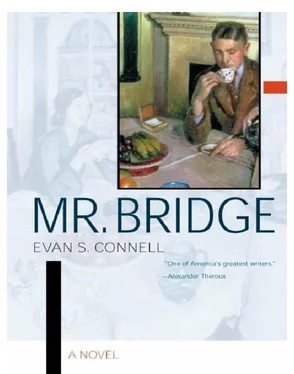“Has this man threatened Couperin?”
“I would call it that, yes. There has been these threats, yes. Quite a few.”
“Harriet, I don’t mind telling you I don’t like this. I don’t like anything about it. I don’t intend to become involved in it. Surely you can find the money somewhere else.”
“We done asked. Everybody we know, only nobody don’t help. Everybody tell us the same — don’t want to get theirselves mixed up in nothing.”
“I don’t blame them.”
Harriet’s eyes were glistening. “He promise he won’t never do it again.”
“I wish I had more confidence in Couperin’s promise. If you want my opinion, you would be better off if you stopped seeing that fellow.”
She buried her face in the handkerchief and wept without making a sound.
“Borrowing is bad business. You will never get a clearer demonstration of it than you are getting right now. I am sorry, Harriet, but I am not going to lend you the money.”
After she left the study he remained for quite a while in the same position, leaning back in the chair with his chin resting on his fingertips while he thought about the problem; and he thought about Lester, and a number of other experiences with Negroes.
Harriet had been putting on an act, he decided, and he suspected he would hear no more about it. Days passed and he became convinced he was right because she went about her duties with no sign of animosity, and on Thursday he noted that Couperin came by for her as usual.
But the problem of debts turned up again after Mrs. Bridge remarked while reading the evening paper: “I see your friend Horton Bailey is in the news.”
“Friend?” he replied, putting stress on the word.
“Oh, just because you disagree with his politics! Honestly, Walter, what would this country be like if we all agreed upon everything?”
“His politics are his business. It so happens that I do disagree with the man on that score, but I have other reasons for disliking him. Perfectly valid reasons.”
“I thought the two of you got along very well. You mention him every once in a while.”
“I have known the man since the World War but I don’t recall ever saying that he was a friend of mine.”
“I’m mistaken then,” Mrs. Bridge said. “All right, your ‘acquaintance’ Horton Bailey is in the news again. He’s being talked of as a future presidential candidate.”
“I heard that on the radio.”
“Apparently a great many people think quite highly of him.”
“They don’t know him.”
“Now stop being such a boor,” she said rather coquettishly. “Just what information have you that none of the rest of us have?”
“For one thing, the man doesn’t pay his debts.”
“Oh? How do you know?”
“Because he has never repaid me. That’s how I know.”
“Horton Bailey owes you money?”
“Years ago I lent that man five hundred dollars. To this day he has not repaid one cent of it, nor said one word about it.”
“Really? I had no idea. That’s hard to believe.”
“Believe it or not, it’s a fact. After the Armistice he came back here and started a men’s clothing store at Ninth and Walnut. There used to be a lunch counter across the street, and I don’t know how many times I saw Horton Bailey sitting at the counter because nobody was in his shop. I gather that he went around trying to borrow from everybody he could think of and finally he got around to me. I never cared for the fellow and I was having a difficult time myself, but he sounded desperate, so I let him have it. That was the last I saw of it.”
“I’m sure he just forgot,” said Mrs. Bridge.
“He did not forget. He is a ‘deadbeat’—that’s what he is.”
“Now, Walter, you’re not being fair. Have you asked for the money?”
“No, nor do I intend to. The man is what he is. I happen to know what he is and I want nothing further to do with him. I hope to God such a man never becomes President of the United States. I am no great admirer of Herbert Hoover, but at least Hoover appears to be a man of some personal integrity.”
“Well, I confess I’m shocked,” Mrs. Bridge said. “I can’t believe he would do a thing like that. I really think you ought to mention it. Surely it would be worth knowing whether or not he’s forgotten.”
“I will not speak to him about it,” said Mr. Bridge. “I know the man. I know he is completely unprincipled. He came around begging, and I supposed he would have the decency to repay me when he was able, but I was wrong. He’s no good. He never was any good — he was not even a good businessman — and he never will be any good. I don’t care how many millions of people he is able to persuade, Horton Bailey will never again persuade me of anything. I have already listened to the man once too often. He is a liar and he is a cheat. He belongs in prison. Instead, he is a United States senator.”
“I wish I’d never mentioned it.”
“I don’t mind your mentioning it. I’ve never had any reason to tell you how the man swindled me. It’s a thing of the past. I learned my lesson. Beggars are beggars regardless of what else they may be. Since you asked why I didn’t like the fellow, I told you. Furthermore, I suspect I wasn’t the only one he took to the cleaner’s.”
“It’s a shame,” Mrs. Bridge said as she folded the newspaper. “I suppose the best we can hope for is that he’s turned over a new leaf.”
“When that happens,” Mr. Bridge said, “I will be the most surprised man on earth.”
On his way home a few days later, reasonably content with life, as he drove past the Congregational Church he glanced at the sign on the lawn and there he saw spelled out in white block letters for the benefit of anybody who got within a hundred yards of the church the title of Dr. Foster’s next sermon: FORGIVE US OUR DEBTS.
He continued driving but he was no longer so content. The sign had reminded him of Horton Bailey. He could not understand how a man could go through life year after year pretending that a debt did not exist. He thought he would not mind so much if Bailey at least had the decency to allude to it; but the senator, on those occasions when they happened to meet, slapped him on the shoulder and pumped his hand and said not a word about the five hundred dollars.
The longer Mr. Bridge thought about Horton Bailey the angrier he got. He considered sending a letter requesting payment, perhaps demanding payment. Yet he knew he was not going to do this, he could not do it unless the money was absolutely necessary; and the realization of this made him all the angrier so that by the time he reached home he had ruined his appetite.
When there were guests Mr. Bridge went into the kitchen to mix drinks because Harriet did not know how. Carolyn usually followed him to the kitchen and watched while he took the bottles out of the cupboard and measured the liquor. When he had finished he would reach for another glass and look at her inquiringly, and he was always surprised that this did not amuse her. He had played this game with Douglas, who responded by hiccuping and staggering around, and he had teased Ruth, who held out her hand and probably would drink it. But Carolyn’s attitude puzzled him.
One evening when the Arlens and the Lutweilers had been invited to dinner he was measuring gin for the martinis when Carolyn said, “Daddy, you’re breaking the law.” She took a step backward as though she expected him to slap her.
He said after a few moments, “No, it is not against the law.”
Читать дальше












